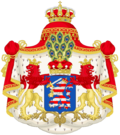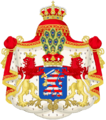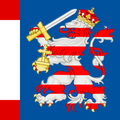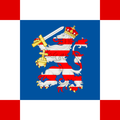Monarchy of New Southern Rhine
| King of New Southern Rhine | |
|---|---|
 | |
| Incumbent | |
 | |
| Jonathan I since 17 January 2021 | |
| Details | |
| Style | His Majesty |
| First monarch | Jonathan I |
| Formation | 6 January 2021 |
| Residence | Hunsrik Palace, Barbarossa |
The Monarchy of New Southern Rhine is the core political institution of the Independent State of the New Southern Rhine. It is a very much autocratic absolute monarchy on which all state powers are vested upon the monarch, who is de jure both the head of state and head of government, even though he might delegates part of his power. The monarch is the embodiment of the Neo-Rhenish State and his title is that of "King by the Rhine" with the style of Majesty. As of the accord which established Jonathan on the Neo-Rhenish throne, in case he abdicates without producing any viable heir, his apparent heirs are King Arthur II of Ebenthal and Emperor Oscar I of Karnia-Ruthenia, who are then to rule the country as a diarchy.[1]
History
The Neo-Rhenish monarchy began on 6 January 2021 with the formalization of the foundation of the Independent State of the New South Rhine. Between 6 and 17 January Arthur II, King of Ebenthal, served as de facto Regent of the Kingdom in search of someone who would accept the throne of the new micronation, then still without geographic definitions. On January 16 Arthur offered the Rhenish Throne to his Lord Speaker, Jonathan Scherer-Arrais, 1st Marquis of Rozandir, who accepted it the following day. Jonathan was consecrated King by the Rhine without losing his status as a citizen of Ebenthal or the political positions he previously occupied.
Upon assuming the throne, Jonathan, in his ascension document, agreed to semi-permanently cede sovereignty over his family's estates to the Neo-Rhenish state, as per the precepts of the Nomadic Micronation Theory.
Succession
According to the Fundamental Laws of New Southern Rhine, the succession is selective, this is, it is up to the present monarch (or to a regent) to appoint his or her successor to the throne. Currently Jonathan's successors are the King of Ebenthal and the Emperor of Karnia-Ruthenia, individually titled Prince of Blumenau and Prince of Pomerode, respectively, due to the informal accord made between the three of them on giving the Rhenish throne to King Jonathan.
Nonetheless, despite the monarchy not being hereditary, the members of the reigning family are titled "Prince/ss by the Rhine", also informally called "Rhenish Prince/ss".
Powers
The New Southern Rhine is an absolute monarchy on which the monarch holds supreme autocratic authority, not being restricted by written laws and legislature. His powers are further detailed by the Fundamental Laws. Executive, legislative and judicial powers derive from and are held solely by the monarch, who freely chooses to exercise those powers directly or indirectly by delegating them to persons, offices and institutions of government.
The monarch appoints the Archsteward freely, although custom and preference, as per the Fundamental Laws, dictates that the Archsteward be appointed among the Stewards. The Archsteward is tasked with appointing ministers of state, handling Royal House affairs, among them government matters, and effectively serving as the country's head of government. The monarch may, however, appoint and dismiss ministers and the Archsteward at will. The monarch also freely appoints and dismisses the Stewards who govern the cantons and take half of the seats in the Katarinensisch Reichskreis, the national parliament. He is also responsible for calling elections for the Commissars who occupy the other half of seats in the Reichskreis. The monarch is solely responsible for enactment of laws, although he has chosen to delegate legislative powers to the Katarinensisch Reichskreis which is an advisory body rather than a parliament itself; the Reichskreis can propose and discuss bills, but they don't pass them and send them to the monarch for his consideration, they ask the monarch to turn their proposals into laws. Judicial power rests entirely and exclusively with the monarch, who exercises it directly in an old-fashioned medieval way, nonexistent a proper justice institution.
List of Monarchs
| No. | Name | Portrait | Arms | Reign | Era Reign duration |
House | Title | |
|---|---|---|---|---|---|---|---|---|
| I | Jonathan I |  |
 |
17 January 2021 |
Present | First Rhenish era 3 years, 10 months, 2 days |
House of Scherer-Arrais | King by the Rhine |
| Ex officio politician in the Kingdom of Ebenthal | ||||||||
Arms and standard
The coat of arms and standard of the King (with some versions for other dynasts) consists of a blue shield with a red and white stripped crowned lion holding a sword and an orb. The type of shield may vary from artist, but the Neo-Rhenish Government has adopted the heater shield on representations of the Royal House and the English shield, as present in the Coat of arms of New Southern Rhine, to represent the country.
-
Arms of the King
-
Standard of the King
-
Standard of the Princes of Royal Blood.
Titles
All members of the Neo-Rhenish Royal Family are titled as Prince/ss by the Rhine with the treatment of Royal Highness. Simultaneously, the members of the House of Scherer-Arrais are also titled Prince of Scherer, a title which is granted by the monarch on his position as head of the house but it is nonetheless recognized by the Neo-Rhenish state. The monarch is titled King or Queen by the Rhine (Hunsrik: Kheenich bei Rhein) and is referred to as Majesty. All consorts automatically inherit the titles and treatments of their partners, regardless of their marital status or religion. Furthermore the King has also granted the titles of Prince of Blumenau and Prince of Pomerode individually to his designated heirs.
Monarch's full title
According to the Fundamental Laws, the monarch's full title includes the noble titles individually held by each monarch. The present title is By Grace of God and the Conference of Santiago, His Majesty The New Southern King by the Rhine and Katarinensisch Prince of the Hunsrik, Prince of Scherer. In original Hunsrisk, it is Für die Gnade Kot und die Konferenz von Santiago, Sayn Majestät Das Neue Süd König bei Rhein und Katarinensisch Prinz von das Hunsrik, Fürst von Scherer.
References
- ↑ Neo-Rhenish Government. The New Southern Rhine. Published on 20 December 2021. Retrieved on 20 December 2021.]


